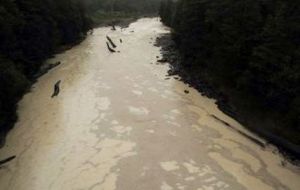MercoPress. South Atlantic News Agency
Chile’s volcanic eruption devastates regions fishing; threatens cattle and tourism
 Rivers have turned into a “thick, vaporous torrent of chocolate” with doubled temperature
Rivers have turned into a “thick, vaporous torrent of chocolate” with doubled temperature A week’s ago volcanic eruptions in Chile’s South have crippled the fresh-water fishing industry there and potentially threaten the cattle industry, too.
National Fishing Service Director Guillermo Rivera told El Mercurio that more than 4.5 million fish have been killed in the Río Nilahue alone as a direct result of the hot volcanic ash and rocks that have rained down into the river since Saturday. La Tercera reported Thursday that the river looked like a “thick, vaporous torrent of chocolate.”
Los Ríos Regional Governor Juan Andrés Varas said the water in Lago Ranco, usually 41 degrees Fahrenheit at this time of year, is currently 113 degrees Fahrenheit.
“You can see vapours emitting from the surface of the water as if it were a hot spring,” Varas told La Tercera. “The texture is like a dark, soupy substance produced from the combustion of all the organic material.”
The long-term effects for the marine life of the lakes and rivers of the area will also have devastating consequences for the sport fishing and tourism industries.
“I’ve never seen the lake like this; it’s a disaster,” Eudulio Velásquez, a cattle rancher, told La Tercera.
“I fish here in the Lago Puyehue and the Río Gol Gol, but I don’t know if I’ll be able to fish here anymore. I think that all the salmon and trout species have been wiped out in the Gol Gol. It’s a tragedy for all the native species,” Velásquez said.
Beyond tourism, basic agriculture is threatened. Agricultural Minister José Antonio Galilea released a statement Wednesday criticizing speculators who are offering ranchers sub-market prices for their cattle in the belief that the animals may die from volcanic ash if they remain in the area.
“It’s regrettable that there are people looking to take advantage of the situation these small-market cattle ranchers are in, trying to convince them to undo all their hard work for measly prices,” Galilea told La Tercera.
Galilea downplays the danger to the cattle. He told El Mercurio the animals are all right and won’t be evacuated unless there is an increase in volcanic activity.
“There is uncertainty, because we don’t know what’s going to happen with the volcano, but there isn’t a large accumulation of ashes on the ground,” he said.
The Servicio Agrícola y Ganadero (Cattle and Agriculture Service, or SAG) has been helping ranchers carpet their pastures with fresh hay and leaves daily so the cattle eat as little volcanic ash as possible. SAG is also transporting ranchers who had to evacuate their land from shelters back to their property to take these precautions.
SAG has also already begun helping ranchers to brand their cattle so they can easily be identified and quickly evacuated if necessary.
Two of Argentina’s airports—Ezeiza and Aeropaque Jorge Newbery—remained closed through Thursday because winds had spread volcanic ash into the region, making air travel unsafe. International airlines affected include American, United, LAN, GOL and TAM.
The eruptions have also affected international crossing stations along the Chile-Argentina border. El Mercurio reported Thursday that over 70 trucks are stuck on the Argentine side at the Pino Hachado crossing in the Araucanía Region and 58 trucks on the Chilean side.
The station was shut down after 45-mph gusts of wind created a snowstorm-like cloaking of black ash. The trucks—carrying cargo to and from Chile, Argentina, Brazil, Uruguay and Paraguay—are immobilized, though they may be able to travel sometime late Thursday, said Gonzalo Gómez, Malleco provincial coordinator of frontier passages.
El Mercurio estimated that the costs in international shipping delays have already exceeded US$100,000.
National Tourism Service Regional Director Fernando Ortúzar told La Tercera that he is already preparing a tourism promotion campaign in an effort to recoup the tourism hit the fishing industry will take.
By Zach Simon – The Santiago Times




Top Comments
Disclaimer & comment rules-

Read all commentsOh dear, bad news for the local animal and fish world then.
Jun 11th, 2011 - 10:33 pm 0Perhaps Noah can help, gotta ship handy ?
Commenting for this story is now closed.
If you have a Facebook account, become a fan and comment on our Facebook Page!